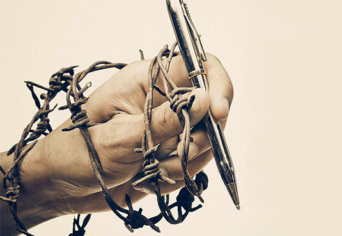- About
- Topics
- Picks
- Audio
- Story
- In-Depth
- Opinion
- News
- Donate
- Signup for our newsletterOur Editors' Best Picks.Send
Read, Debate: Engage.
| located: | United Kingdom, USA, Turkey, Saudi Arabia, China, Mexico, Israel |
|---|---|
| editor: | Gurmeet Singh |
Writing in the U.K., U.S. and much of Europe is simply a professional area. Much like other industries, there are schools you can attend, networks you can build and awards you can receive. Often, from the outside, writers' profiles read very much like the same kind of middle-class, achievement-heavy, success-driven biographies of people who work in law, or in universities, or in business. Even though the rewards are smaller, the chances of success are more marginal and the lives of writers are more romanticised than other professional areas, there is a very clear sense that in some societies around the world, to be a writer is actually a fairly safe (if not exactly prosperous) life choice.
However, this isn't the case for writers in many regions across the world. In many places, writing is still a political act. PEN International, the global network which both helps and represents writers across the world, set up the Writers in Prison Committee in 1960. Since then, it has represented hundreds of writers across the world who are incarcerated for political writings but often also, simply for being writers.
Yesterday, 15 November, was the day of the Imprisoned Writer. In response, PEN selected several cases to highlight the different kinds of persecution writers around the world face. Here are some below:
The reasons for these writers' imprisonment are demonstrably offensive to good sense. There is no legitimate reason why a person should be arrested and imprisoned for criticising a religion, nor is there is a good reason for a writer being imprisoned simply by association; simply by being seen as part of a terrorist organisation.
Europe and the U.S. (and other Western democracies) also limit free speech. The cases of limiting such expression should be, and are, taken seriously. Each is considered on a case-by-case basis and contextualised in the history of the nation they take place. This often leads to a clumsy, confusing characterisation of what constitutes free speech and expression. You might be able to throw up the old Hitler salute in London, but don't even think of trying that in Berlin. The fact of differing contexts confuses a lot of people: why isn't there a single, categorical rule for all people at all times? Simply put, because history is messy and the weight of what people write and say differs according to cultural association. Writing something in the U.K. that can be shown to stir up violence or hatred can lead to prosecution, particularly if any of that intention is based on the old prejudices. This certainly does circumscribe free speech but does not limit it in any reasonable sense, unless of course, your aim in everyday life is to go around stirring up tensions and violence against people.
In contrast, in many other places around the world, in places like Saudi Arabia, Mexico and China, writers are imprisoned based on a single, categorical rule: they challenge power. The level of cynicism involved in single, blanket, categorical rule can be shown in the Raif Badawi case. Badawi blogged certain criticism of the state and the state's use of religion as a tool to control the country, for which he was prosecuted for "insulting Islam". We should pause to consider what might actually constitute to "insulting" a religion. Can a religion feel insulted? Furthermore, it demonstrates exactly Badawi's point: that the state imprisons those who challenge it by using religion as its shield. Badawi's writings would stir up some political challenges to the state but were not likely to stir up violence, or sectarian tensions (Saudi Arabia being a one-religion state).
As such, I think it's worthwhile considering several points:
